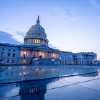State Board of Education Adopts Waiver Policy for Unlawfully Located Nonclassroom-based Charter Schools

April 2017
Number 15
The State Board of Education (State Board) recently approved Policy No. 17-01 (Policy), which permits the board to issue temporary waivers to nonclassroom-based charter schools operating "resource centers" outside the geographical boundaries of their chartering school district. The State Board's decision comes on the heels of a closely watched charter school decision, Anderson Union High School District v. Shasta Secondary Home School (2016) 4 Cal.App.5th 262 (Anderson), which became binding law in California on January 18, 2017 ( see 2017 Client News Brief No. 5 ). The holding in Anderson confirmed that the geographic and site limitations of the Act are applicable to all charter schools, including nonclassroom-based programs.
The Anderson decision left some nonclassroom-based charter schools scrambling to bring facilities operating outside the boundaries of their authorizing school district into compliance with the law. In order to minimize disruption to pupils and educational programs, the Policy sets forth a process to determine whether charter schools will be granted a one-year waiver from compliance with the geographic restrictions of the law. All schools granted a waiver must become fully compliant no later than June 30, 2018.
Charter schools themselves may not apply directly for waivers with the State Board. The authorizing school district must seek the waiver on the charter school's behalf. The charter school will be required to create a transition plan detailing how its resource center will come into compliance with Anderson, and submit a copy of the plan to the State Board and all impacted school districts where the noncompliant facilities are located. A charter school must also give parents regular status updates regarding transition. The Policy is set to expire on November 10, 2017, although the State Board did not preclude review of subsequent waiver requests on a case-by-case basis.
The State Board emphasized that the Policy should not be viewed as an amnesty for charter schools operating noncompliant facilities. Rather, all noncompliant schools must take immediate steps to comply with the law as clarified by Anderson. We encourage school districts and county offices of education impacted by this Policy to work closely with legal counsel to evaluate potential solutions, including providing feedback on individual waivers that come before the State Board. Over 40 waivers are slated for review at the May 2017 State Board meeting, with more anticipated at future meetings.
For more information on State Board of Education Policy No. 17-01, theAnderson opinion or the Charter Schools Act, please contact the authors of this Client News Brief or an attorney in Lozano Smith's Charter School Practice Group or at one of our nine offices located statewide. You can also visit our website, follow us on Facebook or Twitter or download our Client News Brief App.
Number 15
The State Board of Education (State Board) recently approved Policy No. 17-01 (Policy), which permits the board to issue temporary waivers to nonclassroom-based charter schools operating "resource centers" outside the geographical boundaries of their chartering school district. The State Board's decision comes on the heels of a closely watched charter school decision, Anderson Union High School District v. Shasta Secondary Home School (2016) 4 Cal.App.5th 262 (Anderson), which became binding law in California on January 18, 2017 ( see 2017 Client News Brief No. 5 ). The holding in Anderson confirmed that the geographic and site limitations of the Act are applicable to all charter schools, including nonclassroom-based programs.
The Anderson decision left some nonclassroom-based charter schools scrambling to bring facilities operating outside the boundaries of their authorizing school district into compliance with the law. In order to minimize disruption to pupils and educational programs, the Policy sets forth a process to determine whether charter schools will be granted a one-year waiver from compliance with the geographic restrictions of the law. All schools granted a waiver must become fully compliant no later than June 30, 2018.
Charter schools themselves may not apply directly for waivers with the State Board. The authorizing school district must seek the waiver on the charter school's behalf. The charter school will be required to create a transition plan detailing how its resource center will come into compliance with Anderson, and submit a copy of the plan to the State Board and all impacted school districts where the noncompliant facilities are located. A charter school must also give parents regular status updates regarding transition. The Policy is set to expire on November 10, 2017, although the State Board did not preclude review of subsequent waiver requests on a case-by-case basis.
The State Board emphasized that the Policy should not be viewed as an amnesty for charter schools operating noncompliant facilities. Rather, all noncompliant schools must take immediate steps to comply with the law as clarified by Anderson. We encourage school districts and county offices of education impacted by this Policy to work closely with legal counsel to evaluate potential solutions, including providing feedback on individual waivers that come before the State Board. Over 40 waivers are slated for review at the May 2017 State Board meeting, with more anticipated at future meetings.
For more information on State Board of Education Policy No. 17-01, theAnderson opinion or the Charter Schools Act, please contact the authors of this Client News Brief or an attorney in Lozano Smith's Charter School Practice Group or at one of our nine offices located statewide. You can also visit our website, follow us on Facebook or Twitter or download our Client News Brief App.
Disclaimer: As the information contained herein is necessarily general, its application to a particular set of facts and circumstances may vary. For this reason, this News Brief does not constitute legal advice. We recommend that you consult with your counsel prior to acting on the information contained herein.







